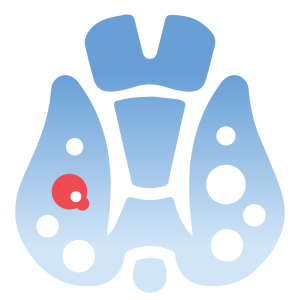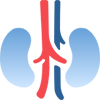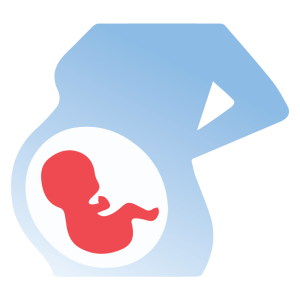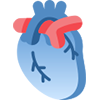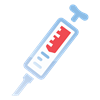Overview
A hernia happens when an internal part of the body pushes through a weakness in the muscle or surrounding tissue wall.
Your muscles are usually strong and tight enough to keep your intestines and organs in place, but a hernia can develop if there are any weak spots.
What is an inguinal hernia?
An inguinal (pronounced “ingwinal”) hernia is the most common type of hernia.
It can appear as a swelling or lump in your groin, or as an enlarged scrotum (the pouch containing the testicles). The swelling may be painful.
The lump often appears when you’re lifting something and disappears when you lie down.
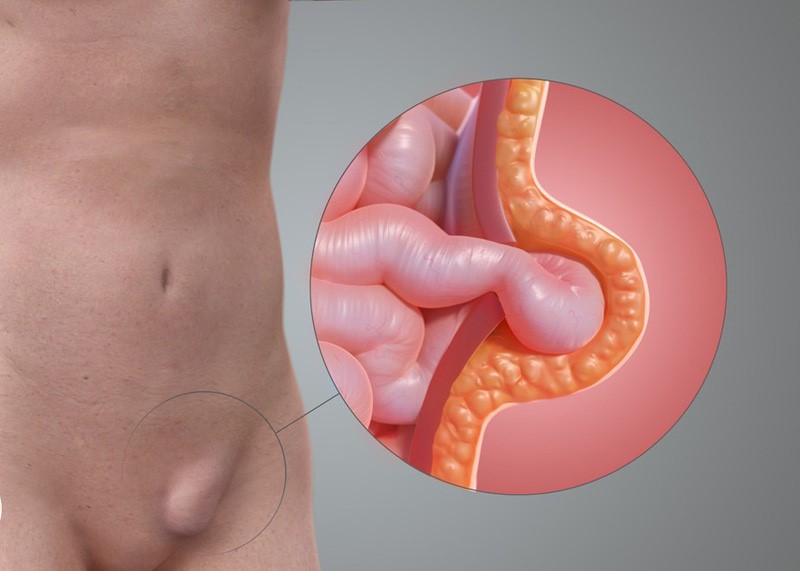
What causes an inguinal hernia?
An inguinal hernia usually happens when fatty tissue or a part of your bowel, such as the intestine, pokes through into your groin at the top of your inner thigh.
It pushes through a weak spot in the surrounding muscle wall (the abdominal wall) into an area called the inguinal canal.
Inguinal hernias mainly affect men. Most are thought to be caused by ageing, although they can happen at any age.
This is because as you get older, the muscles surrounding your abdomen (tummy) can become weaker.
Inguinal hernias can sometimes appear suddenly after putting pressure on the abdomen, such as straining on the toilet if you have constipation or carrying and pushing heavy loads.
They have also been linked to having a persistent, heavy cough.
When is surgery needed?
Inguinal hernias can be repaired using surgery to push the bulge back into place and strengthen the weakness in the abdominal wall.
The operation is usually recommended if you have a hernia that causes pain, severe or persistent symptoms, or if any serious complications develop.
Complications that can happen as a result of an inguinal hernia include:
- Obstruction– where a section of the bowel becomes stuck in the inguinal canal, causing nausea, vomiting and stomach pain, as well as a painful lump in the groin
- Strangulation– where a section of bowel becomes trapped and its blood supply is cut off; this requires emergency surgery within hours to release the trapped tissue and restore its blood supply so it does not die
Surgery gets rid of the hernia to prevent any serious complications, but there’s a chance it could return after the operation.
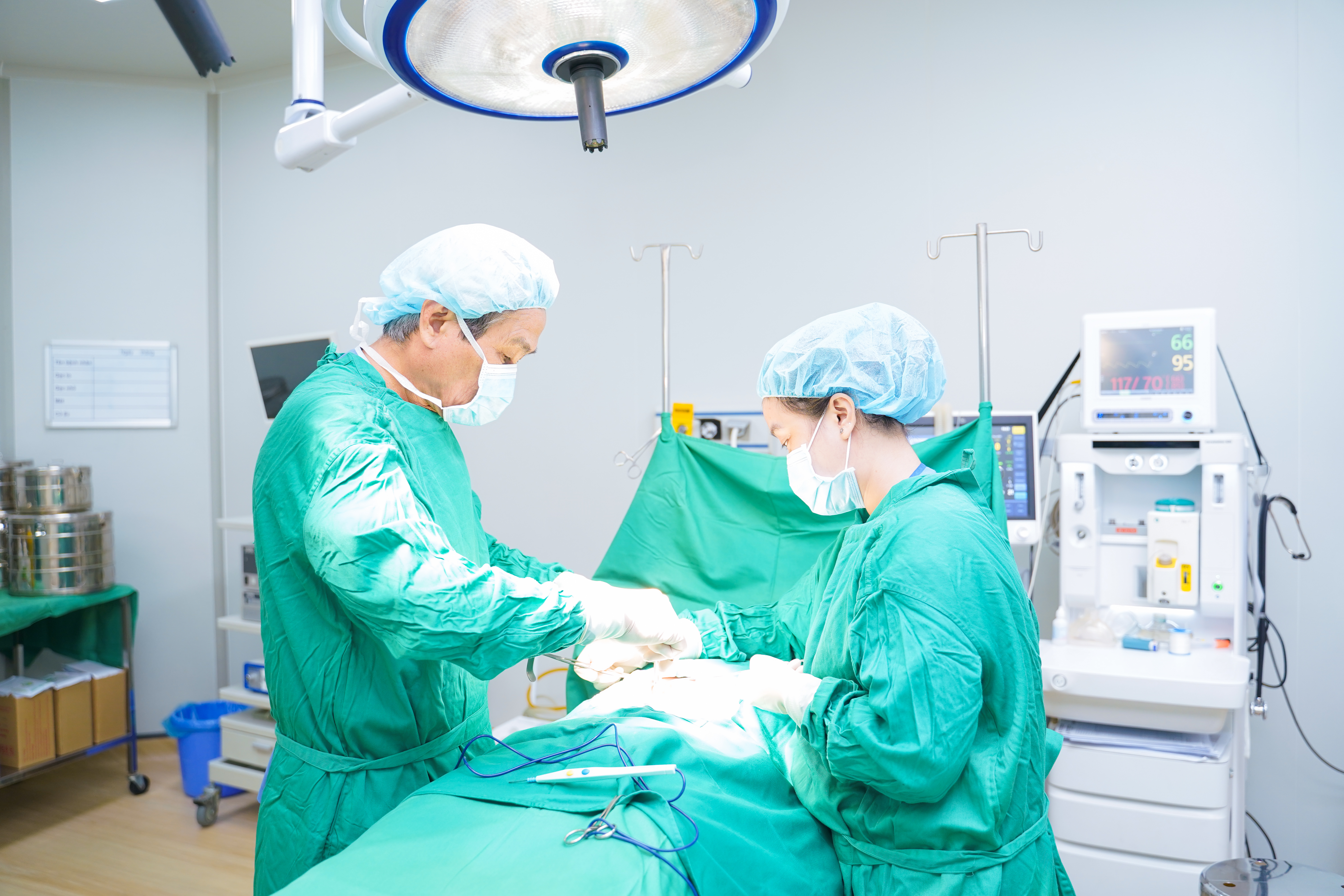
What happens during surgery?
There are 2 ways an inguinal hernia repair can be performed:
- Open surgery– where a cut is made to allow the surgeon to push the lump back into the abdomen
- Laparoscopic (keyhole) surgery– a less invasive, but more difficult, technique where several smaller cuts are made, allowing the surgeon to use instruments to repair the hernia
There are advantages and disadvantages to both methods. The type of surgery you have depends on which method suits you, and your surgeon’s experience.
You should be able to go home the same day or the day after surgery. It’s important to follow the instructions you’re given while in hospital about how to look after yourself.
This includes eating a good diet to avoid constipation, caring for the wound, and avoiding strenuous activities.
Most people make a full recovery from inguinal hernia repair within 6 weeks, with many being able to return to work and light activities within 2 weeks.
Ask your surgeon or GP for advice on when it’s safe for you to drive again. You should also speak to your insurer before driving again after having surgery.
Are there any risks from the operation?
An inguinal hernia repair is a routine operation with very few risks. But a small number of hernias can come back at some point after surgery.
Other potential complications of an inguinal hernia repair include:
- Blood or fluid building up in the space left by the hernia (this usually gets better without treatment)
- Painful swelling and bruising of the testicles or the base of the penis
- Pain and numbness in the groin area caused by a nerve being damaged or trapped during surgery
- Damage to the blood supply to the testicles
- Damage to the vas deferens (the tube that carries sperm to the testicles)
Diagnosis and treatment of inguinal hernia at An Viet Hospital
When visiting and treating at An Viet hospital, customers will be examined and diagnosed according to the following steps:
- Clinical examination: Most inguinal hernias only need to be detected by the doctor by clinical examination, observation or palpation of the bulge in the groin. In the case of small hernias, doctors need to use other specialized techniques to determine.
- Clinical examination: The doctor appoints ultrasound to check the internal properties of the hernia, determine the location, size and assess the status of blood circulation.
- Ultrasound: This technique helps doctors accurately assess the specific condition of the patient through the display on the scan screen.
Dr. Thang at An Viet Hospital shared, the treatment of inguinal hernia will be considered based on the age and specific condition of the patient.
Newborn babies with congenital inguinal hernia can be treated and monitored, waiting for the peritoneal tube to close on its own.
For patients with advanced age, weak health or a history of many comorbidities, the doctor will usually consider conservative treatment, using a hernia sac hanging strip.
For children and adults, treatment of inguinal hernia is considered with 2 main methods: laparoscopic surgery or open surgery:
- Laparoscopic surgery: The doctor makes a very small incision in the patient’s abdomen, inserts the laparoscope and specialized medical instruments to fix the inguinal hernia.
- The advantage of this method is that it ensures high aesthetics, the patient recovers quickly and leaves little scars.
- Open surgery: This is a familiar method of inguinal hernia surgery in the past, but patients need more time to recover compared to laparoscopic surgery.
Advantages when examining and treating inguinal hernia at An Viet Hospital
If you suspect or confirm that you have an inguinal hernia, you can choose An Viet General Hospital at 1E Truong Chinh, Thanh Xuan, Hanoi. This is a reliable medical facility, chosen by a large number of customers.
At An Viet Hospital, the process is carried out to ensure maximum safety and efficiency:
- Effective treatment regimen, suitable for each case: An Viet Hospital applies both medical and surgical methods.
- Team of good doctors: An Viet owns a team of experienced and qualified doctors with many years of working in major hospitals such as: Saint Paul General Hospital, Viet Duc Hospital, etc.
- Modern equipment and machinery: In order to serve the process of medical examination and treatment safely, accurately and with high efficiency, An Viet is equipped with a system of modern machinery: automatic blood testing machine with 24 parameters, 4D ultrasound machine, high frequency machine for the treatment of diseases.
- Reasonable medical examination and treatment costs: At An Viet Hospital, the examination costs are public and transparent before the patient makes an appointment. After diagnosing and consulting treatment methods, the doctor will inform all specific costs for the patient to understand. Therefore, customers can fully be active during their medical examination and treatment process.
- Insurance payment support: An Viet supports insurance payment up to 100% depending on the type of patient participating. Ensure that the procedure is done quickly and in accordance with regulations.
- High confidentiality: When visiting the hospital, all patient information is absolutely confidential by the hospital. All procedures and medical records must be approved by the patient.
- Dedicated online consulting support: To ensure the best service quality, An Viet supports free phone and text messages for customers. Patients can book an appointment online for assistance in arranging a reasonable examination time.
- Doctor CKI Phan Van Thang has many years of experience in the field of Urology. The doctor has practiced advanced techniques at major medical training centers of the country such as Viet Duc Hospital, University Hospital of Medicine and Pharmacy in Ho Chi Minh City, Popular Hospital – Grade I specialty hospital. on general surgery, urology…
Right now, if you are in need of advice on inguinal hernia, do not hesitate to call 1900 2838 – 0965 98 3773 for assistance.
———————————————–
AN VIET GENERAL HOSPITAL
Address: 1E Truong Chinh, Thanh Xuan, Hanoi
Hotline: 1900 28 38 – 0965 98 37 73
Website: www.benhvienanviet.com
Fanpage: https://www.facebook.com/benhvienanviet
Download An Viet Hospital APP to “Look up results – Book an appointment – Video Call with a doctor” and more: https://onelink.to/pjmasd

